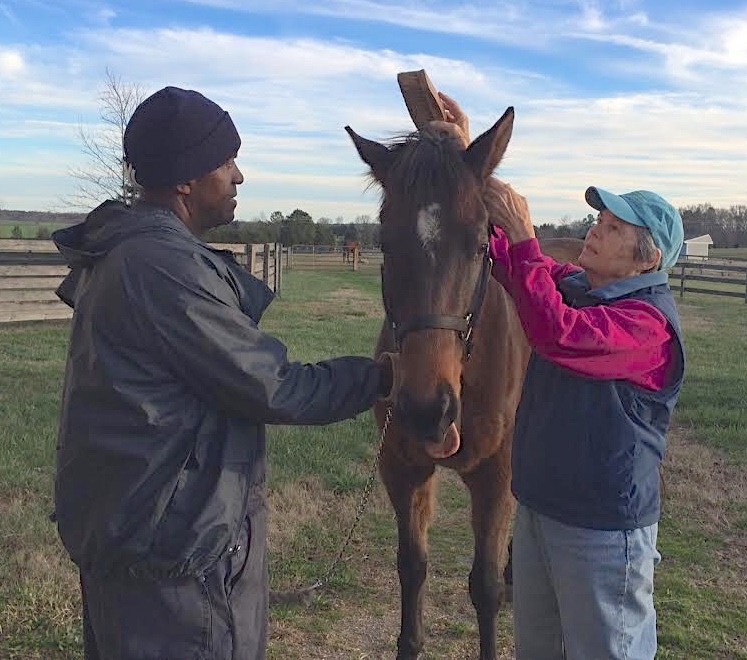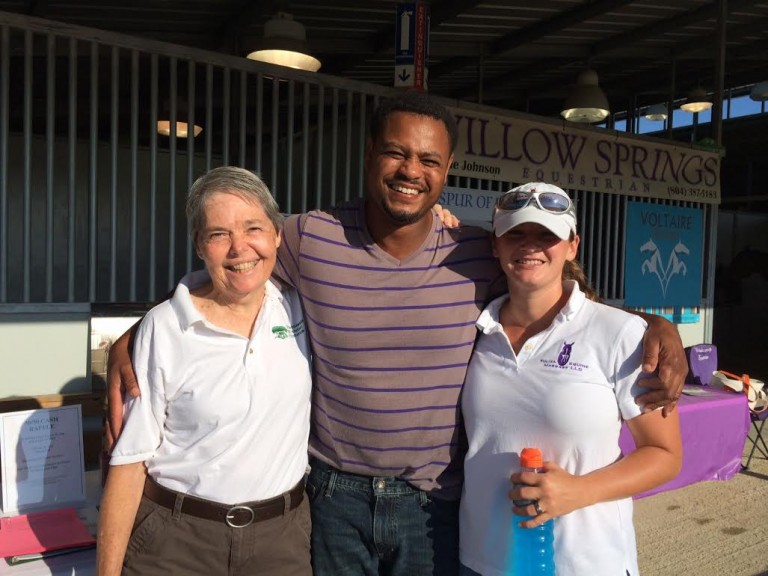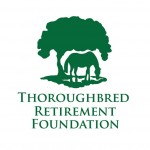
Anne Tucker, 73, grooms a horse with boarder Norman King, a former inmate and graduate of the TRF’s prisoner/racehorse program Second Chances. Photo by Linda Passaretti
A 73-year-old Virginia woman who boasts a connection to Kentucky Derby winner Day Star, is doing something absolutely stellar with her modest horse farm.
For the last bunch of years, Anne Tucker has taken “a big leap of faith” and welcomed former inmates to her farm, providing a roof over their heads, rent free, and a path to transition from prison to society.
“At first, my family was not as enthusiastic about the idea as I was,” Tucker says. “My husband had some reservations and my daughter did too. But in 2009, I welcomed Tamio Holmes to come live on the farm … I knew what a great person he was, what a hard worker, and thought it would be nice to have him around.”
Holmes had just graduated from the Thoroughbred Retirement Foundation’s (TRF)prisoner/racehorse program Second Chances at the James River Work Center when he was offered the chance to live rent-free and get back on his feet. Holmes, who learned horsemanship and farrier skills through the TRF training in prison, was spring-boarded into a new life. (Please see an earlier story here). Today he owns a successful farrier business, and was recently married.
Holmes lived on Tucker’s farm for nearly two years. After she watched him return to society a new man, she opened her doors to former inmate and TRF graduate Norman King, 60.

Tucker, on right, walks with Penny Chenery’s daughter Kate Tweedy, and Secretariat descendant, Covert Action. Covert Action was the first horse welcomed into the TRF’s James River program.
In this week’s Clubhouse Q&A, Tucker, a founding member of the TRF’s Second Chances program at the James River Work Center, and past president, discusses her life helping racehorses and inmates.
Q: You didn’t hesitate to open your home to a former prisoner. Why?
Before I offered the house to Tamio, we had another person who lived on and helped with the farm chores. When that person left, Tamio just popped into my head. And I thought, now there’s someone who could do this work, and do it very well. He had a great personality, was a lot of fun, and it would be great to have him around.
And I knew he was going to struggle when he was released. He’d already gone back to prison (after a prior incarceration). He was on work release working for Dr. Tom Newton by day and returning to the prison at night. He was also working with a highly respected farrier named Bill Lane. All he needed was a leg up with getting a roof over his head and utilities in exchange for morning and evening help with the horses.
Today, Tamio is one of the stars of our (Second Chances) program. He has done so well for himself, has a thriving business, and just got married to an amazing woman.
Q: Having a place to land and call home is so important to a former inmate.

Tucker, left, with Tamio Holmes and massage therapist Courtney Davis.
Most of these men come from very negative backgrounds, and part of the reason they’ve gotten in trouble is that they don’t take the time to think things through. Incarceration is also an extremely negative situation. So when the men come out, even if they’ve taken the Groom Elite/Second Chances class and become certified (in horsemanship), they still lack that additional experience of living outside (prison walls) and thinking things through. Working in a barn, and having a place to live, even my modest 3-bedroom Cape with no frills and no dishwasher, gives them a chance to stop and think.
For instance, when they leave the barn at night after night check, they’ll learn to think it through and to ask themselves basic questions, like, did they remember to make sure everything is turned off.
They learn to conduct themselves in ways that are second nature to us, but that they need to re-learn.Most of these men come from very negative backgrounds, and part of the reason they’ve gotten in trouble is that they don’t take the time to think things through. Incarceration is also an extremely negative situation. So when the men come out, even if they’ve taken the Groom Elite/Second Chances class and become certified (in horsemanship), they still lack that additional experience of living outside (prison walls) and thinking things through. Working in a barn, and having a place to live, even my modest 3-bedroom Cape with no frills and no dishwasher, gives them a chance to stop and think.
Q: How did you get involved with helping prisoners?
For me, it all started with my love of horses. My great-grandfather Thomas Jefferson Nichols owned the 4th Kentucky Derby winner, Day Star. And my grandfather Silas Kenney Nichols had some stakes horses and broodmares. I never knew him, because he died of pneumonia at an early age. But being his granddaughter was kind of an entry ticket for me to the backstretch of any training track; I was always introduced as ‘Kenney Nichol’s granddaughter.’

Tucker enjoys a moment with Covert Action.
Although I didn’t go to work with horses—I went to the University of Kentucky and got an undergrad in microbiology and a graduate degree in toxicology, and had a professional career in immunotoxicology.
I always loved horses. And my daughter was a very good rider. I became a horse-show mother. And in 2007, I got involved with a group of people talking about putting horses at the James River Work Center. We thought it would be a great way to take care of horses, and help inmates learn new skills. The idea combined my love of horseracing and my love of the horses.Although I didn’t go to work with horses—I went to the University of Kentucky and got an undergrad in microbiology and a graduate degree in toxicology, and had a professional career in immunotoxicology.
In 2007, we took our first horses in at James River, and I was there the day that Tamio Holmes took hold of the halter of Covert Action, our Secretariat grandson. Watching their relationship is part of the reason I’ve spent so much time invested in this program. That’s when I saw how much horses meant to those men.
Q: After Tamio Holmes transitioned back to society you took in another ex-con.
Norman King, we call him Norm, came here in September 2014. He’s in his 60s, and I knew he’d have an extremely hard time getting a job. He served quite a bit of time, some of it in a federal penitentiary. He’s working out very well.
He’s extremely reliable. I know that if I say we’re going to feed the horses at 4 pm., that when I walk down to the barn, every stall will be ready, filled with hay and fresh water. And we’ll go get the horses.
And he loves the horses.
Norm is very hardworking and just trying to get himself out of the hole he dug. Like so many men when they get out of prison, he had nothing.
Most of these men have little if anything when they are released: no job, no living quarters, no driver’s license or any idea of how to get one. Many have outstanding fines to pay, sometimes into thousands of dollars, and often back child support. It is a big hole to dig out of, often with no help.
It’s no wonder that some of them wind up back in prison. We are trying to change that. — This Q&A was originally published on Feb. 16, 2016. To read more about the TRF and Second Chances, please visit this site:http://www.trfinc.org/trf-second-chances-program/


Thank you
Wow, how wonderful and sweet to see humanity in action ????????????
I LOVE this story. It proves that no matter the person, if they are given some skill and a chance they can thrive. Horses only accelerate the process. I only wish I was in a position to give back like Mrs. Tucker is.
Great work, Anne! Thank you for believing so strongly in rehabilitation. The establishment of a framework is something so many people take for granted that they fail to see how blessed they are to have one.
Take care,
Mary in Boone